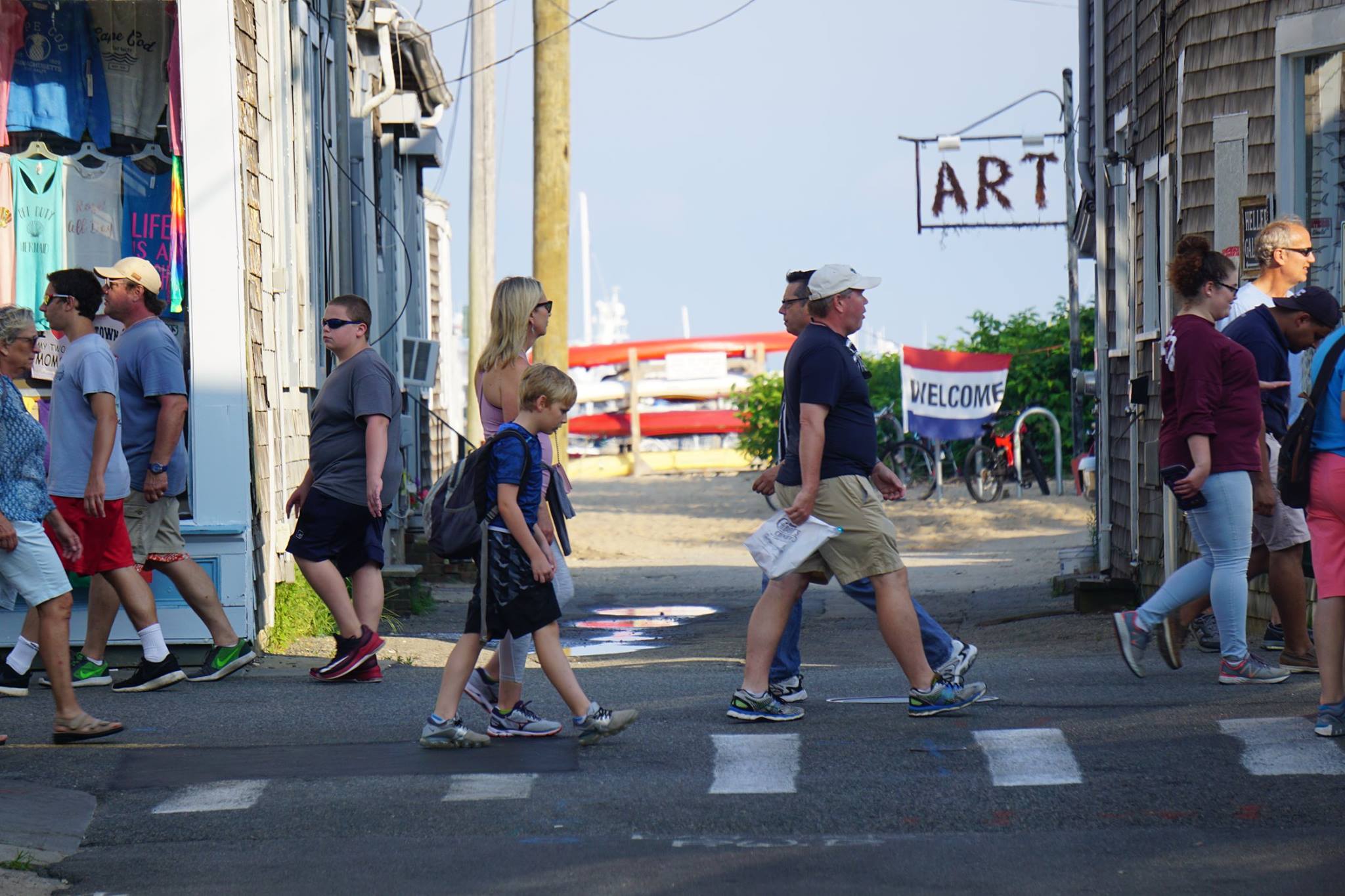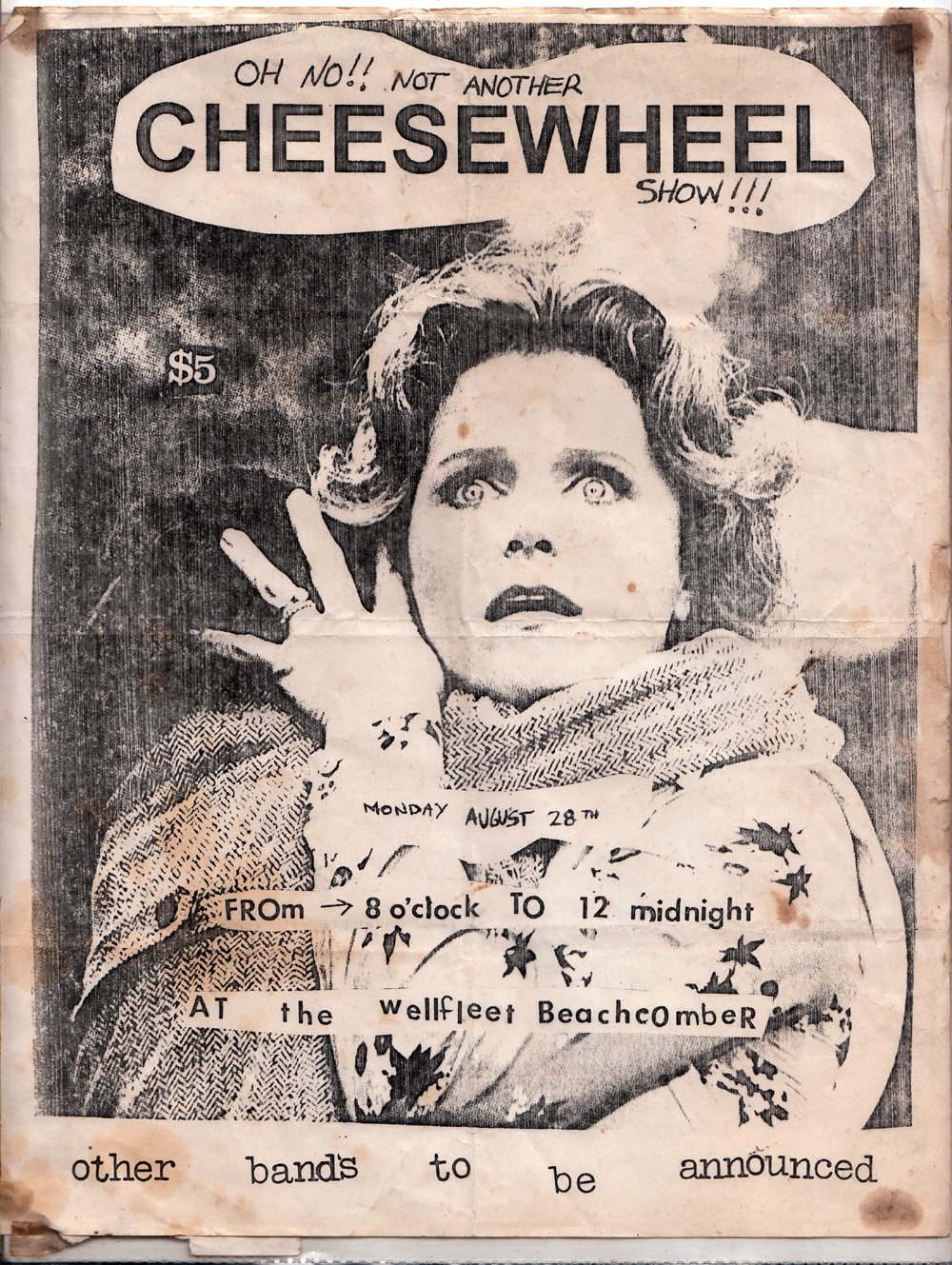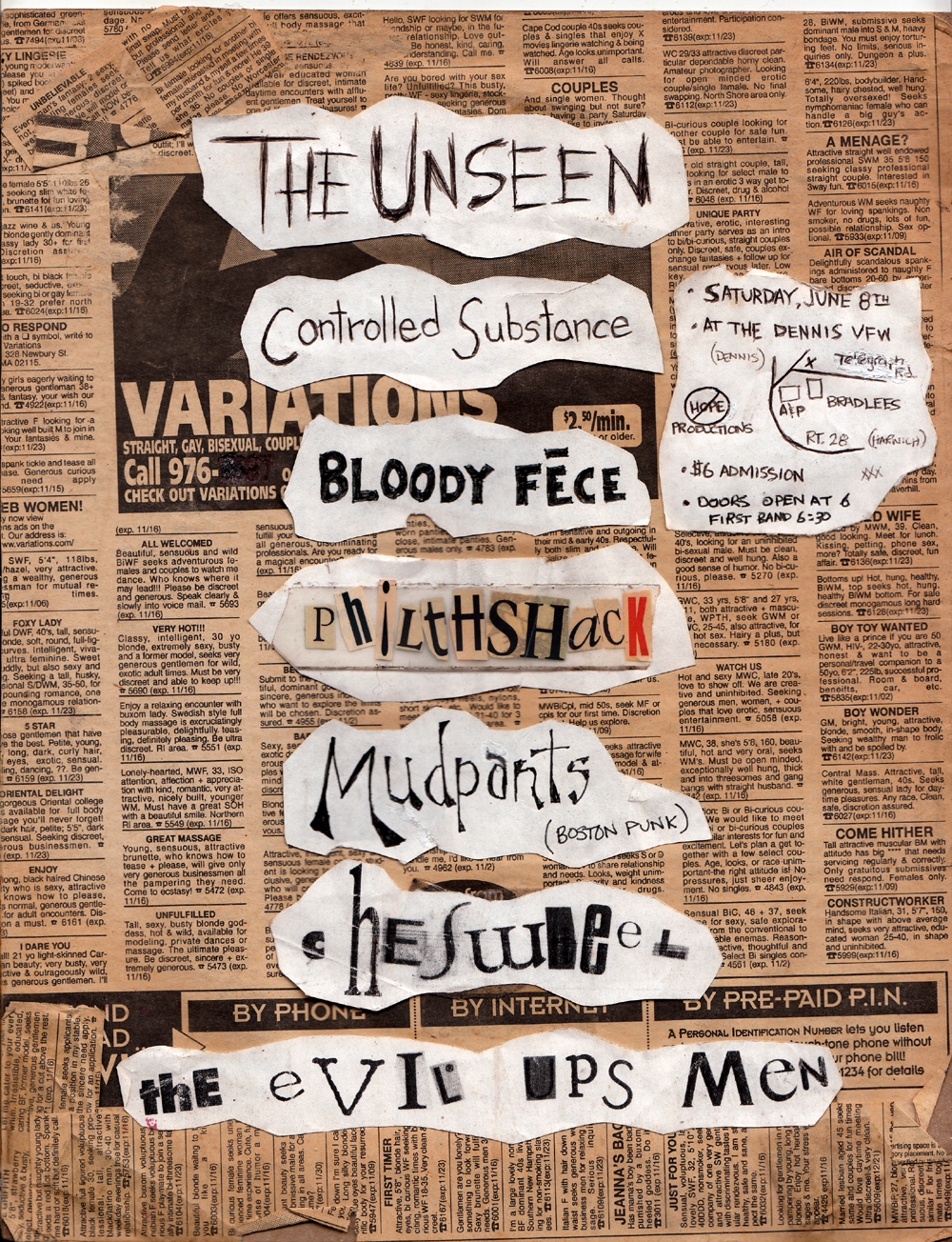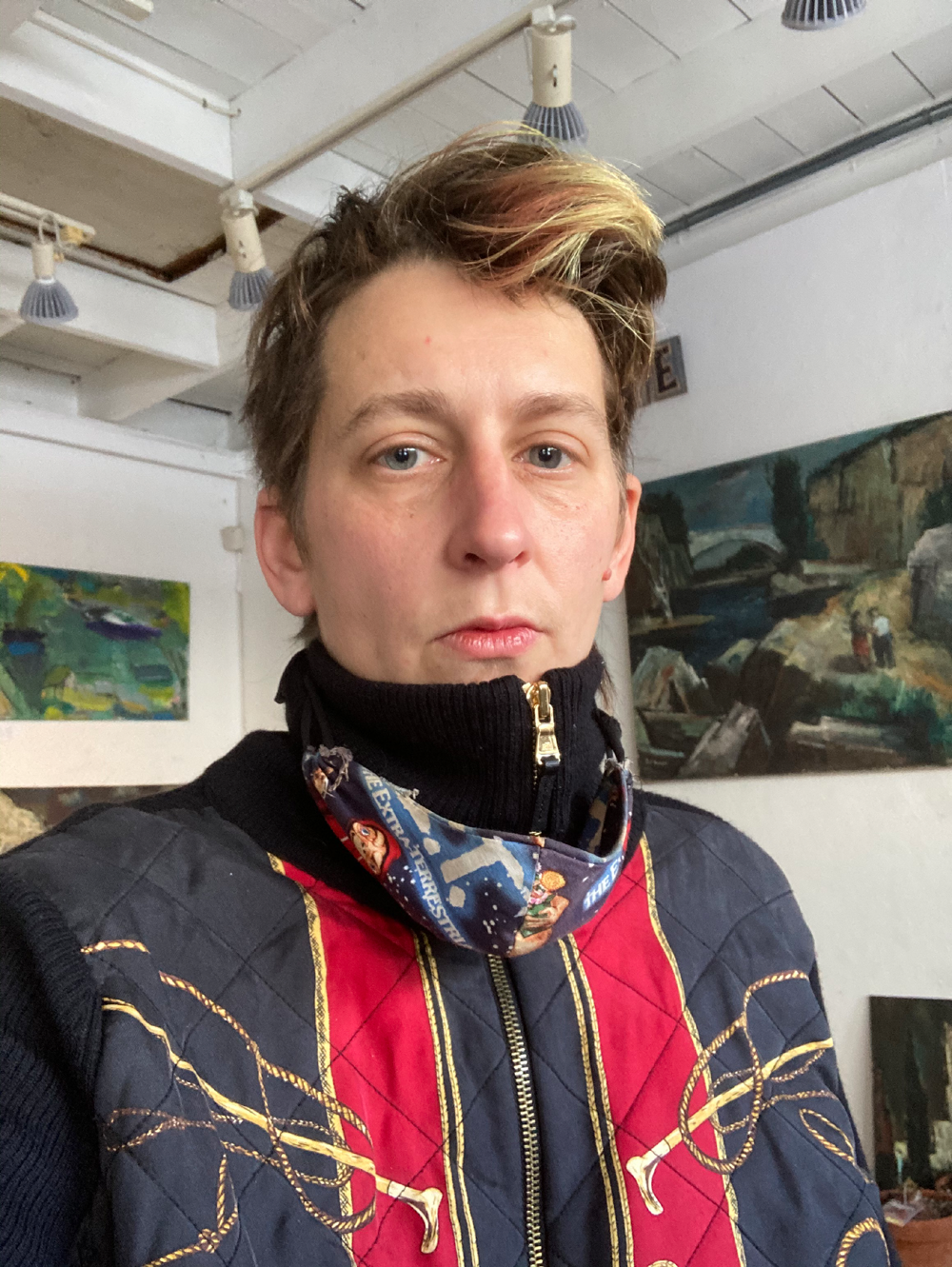
GRETA RIBB: THE INTERVIEW: Part I
For the longest time, I would sit through meetings and hear the others speak about the artist who created the iconic ART sign that hangs high in the Gosnold Street alley at the Julie Heller Beach Gallery. Photographs of the sign have been prominently featured in Provincetown pieces in Smithsonian Magazine, The New York Times and Mo Rocca’s Provincetown: An Eccentric's Sanctuary - CBS News. I always had the image of Greta as being a baby boomer in the twilight years of their wreathing career.
At one such meeting, someone uttered their name in full – Greta Ribb. For whatever reason I was completely flabbergasted. The ART sign seemed to have been hanging in the alley from a time that would precede their days. I knew Greta as the equal half of the controversial performance act Dump Betty. I knew who they were, I had never actually formally met Greta but was introduced to their music by Dump Betty’s biggest fanboy, the artist Joey Mars.
Shortly after we coordinated a rewreathing of the sign, I found myself faced with a conundrum concerning an old MG sports car that our insurance company deemed a liability and requested that the junker be removed to secure our new policy. When they returned to finish up their inspection, the vehicle had miraculously been transformed into a flower pot.
“It’s art,” I explained. Greta’s MG Carden received a nod of approval and the policy was activated. Greta’s DNA is everywhere at the Heller Beach Gallery. Who the fuck is Greta Ribb?
“The duo DUMP BETTY perform/ create a punkish, comedic, distorted noise reggae, hiphop sound. Jessica Teffer as Dump Betty on guitar, sax and lead vocals and Greta Ribb as Backfill Debby on keyboards, samples and vocals. The two of them channel these grungy rural characters who work at a local bottle dump with visions of Hoss love, break dancing and tourist knick-knacks. Think John Waters meets early, early Go-Go’s. They have a small cult following who know all the words to their songs. They both are members of the outer Cape Cod art collective known as Big Collage. Jessica has a knack for sewing and creates some wild embroidered art pieces while Greta creates floral arrangements and loves welding the Ribb family’s patented clam rakes.” - Joey Mars – Artist
“Director of the Big Collage Art Collective, and industrial/punk musician Greta Ribb is a Cape Cod artist down to her core. Their work is as emotionally complex as their surroundings and wants people to know that, "It doesn't have to have a nautical theme to be Cape Cod art. - Erin Cisewski – PRX
Big Collage is a collective of creative Cape Codders from visual artists to musicians , performers, writers and chefs in both traditional and contemporary media. They are serious artists who put intention over credentials, who view art as a vehicle for personal and social transformation. - Cape Cod Times
Cape Cod is synonymous with art, with literally hundreds of galleries. The past few years have seen something of a revolution in the art world, however, as a new guard of contemporary, often younger talent has started taking a more prominent place in what has been mostly a traditional arena. - Dinghy

MLTV: Here we have the Cheesewheel flyer and that's the first local concert you ever went to. Now, at this point, could you make a clam rake?
GR: No, I couldn't.
MLTV: Okay. Could you do floral design?
GR: Yes. My grandfather let me arrange flowers. He would let me cut them from his house and let me arrange them in cocktail glasses and anything that he had around.
MLTV: And your splinter talents like sign-making? Were you making music? Were you already writing music before you saw your first show?
GR: Definitely. The whole thing was understanding that other people are making music because me and my sister are also making music. Yeah.
MLTV: Tell us about Cheesewheel at the Beachcomber in Wellfleet.
GR: Oh my god. It was probably the most exciting night of my life. Some kids handed off a flyer downtown in Chatham just trying to tap into the alternatives. We got the flyer. We went there. And that's what happened.
MLTV: But what was Cheesewheel’s music like?
GR: Cheesewheel is kind of like a weird garage/indie kind of thing that makes you want to go back to the Cape. It's a little, like, math rock but it's got something else going.
MLTV: Anyone that we would know from that band?
GR: My buddy Tim Graham, who's an amazing visual artist. My buddy Rob Kelly, who's still here on the Cape. My friend, Brandon who last I heard was doing audiobook readings.

MLTV: So, what was the name of your first band?
GR: Bloody Fece.
MLTV: You knew you weren’t gonna get rich. Was that you sitting there trying to be provocative? Or were you just fucking laughing?
GR: Ah, that's a good question. I think that we were trying to be a little provocative. But I also think that we were just trying to get attention I mean it's just like when you're young and you're in high school and you just want it all. You just want the spectacle. You want the clout, but you don't care what comes first.
MLTV: What was the lineup in that band?
GR: It was me, my sister and my partner at the time Justin and my friend Tim who was just coming out of the closet and wasn't quite there yet but him coming out was like a huge thing for the band.
MLTV: And what were some of the song titles?
GR: “1-2-3, I Shit Myself” and a bunch of flying feces. It was a big performative thing.
MLTV: You were throwing feces at the crowd?
GR: Yeah, but it was all brownies and ketchup. That was sick loading all that into adult diapers throwing it at the crowd and making them jump. It was really exciting
MLTV: Did you perform at school?
GR: No. VFW shows and Juice Bar benefits. It was pathetic because the room would get cleared.
MLTV: Did your mom and dad ever see you play?
GR: They both saw me. They were really supportive I’d have to say.
MLTV: Who is Tom Fettig?
GR: Tom Fettig is one of the most influential people in my life. He was older than us. And he taught me and my friends how to set up a show. You know, he taught us how to organize. He taught us how to make it bigger than our own weird little high school egos. We’d watch him and his friends setting up “Food Not Bombs” fundraisers and canned goods fundraisers.
MLTV: That's his background?
GR: Yes, organizing. Eventually he started putting together fundraisers for bigger causes like a high school venue. That's how we got started on the Juice Bar.
MLTV: What was the layout for the All Ages world?
GR: I mean at my age, at 14 years old, I was allowed to go to the Beachcomber. And that was a really big thing. It was really exciting. It was on Monday nights. I feel like it was 1994 to 1997. For some reason the managers of the Beachcomber just thought it was okay to shut down the bar and have all these crazy hardcore bands like come for the young people on Cape Cod. Bands like Sam Black Church and Honkeyball. But then it was also local bands that had a strong following like Cheesewheel, Skivies and Evil UPS Men, No Siento and The Fleece. And it was this really nice like meeting of Boston hardcore bands, people that - I'm gonna use air quotes – “mattered” and Cape Cod bands. It was really fucking nice. It drove home a connection in New England.
MLTV: How did the Juice Bar evolve out of that?
GR: Well, what happened was in the mid 90s, there was this thing where we were all pushing for a performance space. An open space for people to go, for young people to go and recognizing a need for a creative outlet for bands - punk bands. So, we had fundraisers for this thing and it ended up funneling into town stuff and the money ended up funneling into a youth center but the alternative aspect was definitely accentuated. Something for the Lower Cape kids.
MLTV: 1998 was really rough a year because by this time, the band had no place left to play.
GR: No, we didn't. And it was bad and I feel like we did it ourselves. You know like pushing the envelope, a fair amount of cultural intolerance, but also just, we were pushing it.
MLTV: Did you look for the expression on the people's faces that ran those establishments when you handed them the Bloody Fece promo kit?
GR: I mean, yeah, honestly, trying to find a place for that culture was really hard.
MLTV: Small Town politics.
GR: Yeah.
MLTV: That was the tail end of high school days, getting The Juice Bar open.
GR: Yeah, The Juice Bar was open. I wasn't allowed to be there because I was over 18. So, that meant anyone that grew up going to that place, when they turned 18, they weren't allowed back. Anybody that fund-raised, anybody that played shows in those past few years - formative years -was not allowed to go to that space. It seems a little bit uptight but it's really not - it kind of makes sense. So there was like a new thing happening and then, eventually, we were gonna start our own thing you know.
MLTV: So when you weren't allowed in the juice bar anymore what did you do? You just end up creating your own DIY shows? Or do you try to get a night from a club?
GR: I mean, back in that time there were a lot of underground performances, music production, some weird house shows, but it didn't have too much of a form. I was making a lot of music.
MLTV: So what evolved out of that? Recording?
GR: Well, I went off to college, and then I came back and I revisited things with my sister. We had a little project, Hurtful Sisters.
MLTV: Are there recordings?
GR: Yeah.
MLTV: Bloody?
GR: I have more.
MLTV: How are we gonna make them available?
GR: I think eventually they will become part of the From The Heart Media Bandcamp, the most comprehensive place on line for all these local recordings, curated by my friends Tim Sylvia and Rob Kelly, lead singer and guitarist of Cheesewheel. All connected.
MLTV: When you were at college did you lose touch or were you still able to tap into what was going on? You know, not being allowed in the Juice Bar, and college, did you lose traction with the scene at all?
GR: Honestly, I'm gonna have to admit, as a human, I got bitter about it. We spent all our time and energy raising money and then I wasn't allowed to walk through the doors. Yeah. I’m gonna get all the kids doing bad things, or something like that. I don't know. It was funny. It was weird. But I also felt like I had to step the fuck out of the way because you gotta know when to. Honestly it freed new energy. That's it.
MLTV: Did that continue?
GR: It did. It was strong for a while. There were a lot of bands coming from Boston to the Juice Bar. It was really nice. Hardcore bands from Boston! Yeah! (laughs). The Dropkick Murphys played at the Juice Bar. I am sad that I missed that. Or maybe not. Cuz…..you know.
MLTV: Who is Tim Sylvia?
GR: Oh my god. Tim Sylvia? Cape Cod god. Tim and I met a long time ago at a convenience store, and he was a musician, had a lot of energy, just a lot of swirling, churning energy. Eventually, after knowing him for a little while, he just picked up and carried the scene. He founded From The Heart Media. I feel like maybe you should interview him because he picked up and carried the scene for a long time. Making an inclusive open mic setting which was huge for Cape Cod. Getting people to come out to perform. They perform and then they do play a show and be, “I'm a thing.”
MLTV: Open mics are some of my favorite things in the world.
GR: It's really good because it just helps people form a comfort level and get them into a zone where they want to share it. Once they get confidence, all of a sudden they start exploding. I've been through open mics. It's a design for them. You see someone come back into the third month, and that is fun. Amazing. Why haven't you been discovered? To witness the evolution. That's the reward of the open mics.
MLTV: Is Tim Sylvia, a musician too?
GR: An amazing guitarist and songwriter. How Are We Hawaii? was his prolific late Cape band. Indie rock thrash. Very beautiful in the Cape Cod audible aesthetic but a little sad. You gotta listen to it.
MLTV: Are there any videos of the shows?
GR: There's bandcamp. I also made a bunch of videos.
MLTV: What was Friends Forever Fest?
GR: I think that lasted for four years. That was a good annual placeholder. Anything progressive on the Cape would go there. It was amazing. A From The Heart Media thing, music festival.
MLTV: And why did that come to an end?
GR: There's been this influx and mass exodus from Cape Cod - over and over again. That's the thing we have to deal with, you know, everything coming and going, and it's not as predictable as the summer is, there's a really weird curve to the fall.
Cape Cod is a really transient place for culture, which makes it a really interesting place for culture. No. No, it’s who's looking at the placeholders and who wants to make a brand new thing.
MLTV: The Black Spot?
GR: Oh yeah, the Black Spot was like a big thing. My friend Micah Power opened this performance visual art cafe venue. That was very open and affirming. All-ages.
Give The Black Spot credit. It was definitely a catalyst and a meeting point for a lot of different people at the time, probably because it was located in downtown Hyannis. And a lot of it was relevant to electronic musicians on the Cape, Life and Times of Sabastian Half, Active Knowledge, Scutopus, Cube2the3rd, James Anderson, Sinking Feeling, and others. I started performing electronic music live as Codeine Schoolboy. That project is 13 years old now. Hard to believe. Now it’s Ghost of Schoolboy. There were also a ton of punk and hardcore shows. It’s where I met the Zookeepers. Micah was another curator/guru. He opened it up.
MLTV: Is there digital documentation of all of that?
GR: It would be nice to have it all in one place. I know there’s plenty of content floating around on YouTube and people’s hard drives.
MLTV: And then, Big Collage?
GR: It was an art performance collective with musical acts, founded by Harley Gardner aka Cube2the3rd and myself. We met at the Black Spot. We’d just go around and occupy different art spaces on the Cape and try and present some kind of alternative culture.
MLTV: So it was a happening or performance theater?
GR: Yeah, video art, live performances, music, visual art, and food. We usually scheduled and planned our events in conjunction with holidays, full moons, and other cues in the calendar. Not sure why, maybe just feigning a more traditional celebration format. Typical Big Collage event included about three musical acts, a couple of video artists projecting their projects, three or four visual artists, even though we did have several group shows. There was a whole group of foodies who would get creative that way. We would make pinback buttons, collaged notebooks and have art raffles to pay for upcoming events. Halloween was huge. We would have a stacked schedule of events. We’d call it the Halloween Meltdown, because it was usually too much. So many costume changes.
MLTV: Did you get back what you put into that?
GR: For five years, we put on events successfully in all kinds of venues on the Cape like the Cultural Center in South Yarmouth, the Guyer Barn in Hyannis, Harwich Junior Theatre, The New Church in Yarmouthport, Cape Cinema in Dennis.
It'd be a group show of all of our friends, and plenty of new people that just got along, felt like an art family. It would be really nice, artists like Gary Peters, Ned Sonntag, Tim Graham...oh my god I love all of them. So much going on. I mean we did so much, it was crazy. So much variety. And then the bands would be so diverse, so many different sounds. The energy just churned and churned for a while. Influence, exchange. Oh it was so awesome. So yeah, I got back what I put tenfold. That was one of the most creatively stimulating experiences of my life.

This concludes Part I of The Greta Ribb Interview. Part II will appear in our Spring 2021 Edition and go out with Part III this coming summer. Keep your eyes peeled for Dump Betty, Free Play! The Lodge, Camp Provincetown, Creation Myths, The Sideshow and Klunky the Clown. Downloads, online exhibits and video magic are on their way.

